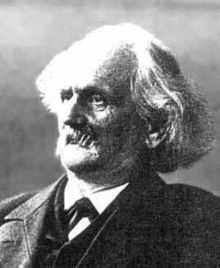Carl Neumann
| Carl Neumann | |
|---|---|
 | |
| Born |
7 May 1832 Königsberg, Prussia |
| Died |
27 March 1925 (aged 92) Leipzig |
| Nationality | German |
| Fields | integral equations |
| Institutions |
University of Halle-Wittenberg University of Basel University of Tübingen University of Leipzig. |
| Alma mater |
Königsberg University Halle |
| Doctoral advisor | Friedrich Richelot and Otto Hesse |
| Doctoral students | William Edward Story |
| Known for |
Dirichlet problem Neumann series |
Carl Gottfried Neumann (7 May 1832 – 27 March 1925), also Karl Gottfried Neumann, was a German mathematician.
Neumann was born in Königsberg, Prussia, as the son of the mineralogist, physicist and mathematician Franz Ernst Neumann (1798-1895), who was professor of mineralogy and physics at Königsberg University. Carl Neumann studied in Königsberg and Halle and was a professor at the universities of Halle, Basel, Tübingen, and Leipzig.
Neumann worked on the Dirichlet principle, and can be considered one of the initiators of the theory of integral equations. The Neumann series, which is analogous to the geometric series

but for infinite matrices, is named after him.
Together with Alfred Clebsch Neumann founded the mathematical research journal Mathematische Annalen. He died in Leipzig.
The Neumann boundary condition for certain types of ordinary and partial differential equations is named after him (Cheng and Cheng, 2005).
Works by Carl Neumann
- Das Dirichlet'sche Princip in seiner Anwendung auf die Riemann'schen Flächen (B. G. Teubner, Leipzig, 1865)
- Vorlesungen über Riemann's Theorie der Abel'schen Integrale (B. G. Teubner, 1865)
- Theorie der Bessel'schen functionen: ein analogon zur theorie der Kugelfunctionen (B. G. Teubner, 1867)
- Untersuchungen über das Logarithmische und Newton'sche potential (B. G. Teubner, 1877)
- Allgemeine Untersuchungen über das Newton'sche Princip der Fernwirkungen, mit besonderer Rücksicht auf die elektrischen Wirkungen (B. G. Teubner, 1896)
- Über die Methode des arithmetischen Mittels (S. Hirzel, Leipzig, 1887)
- Die elektrischen Kräfte (Teubner, 1873-1898)
References
- O'Connor, John J.; Robertson, Edmund F., "Carl Neumann", MacTutor History of Mathematics archive, University of St Andrews.
- Carl Neumann at the Mathematics Genealogy Project
- Cheng, A. and D. T. Cheng (2005). Heritage and early history of the boundary element method, Engineering Analysis with Boundary Elements, 29, 268–302.
|